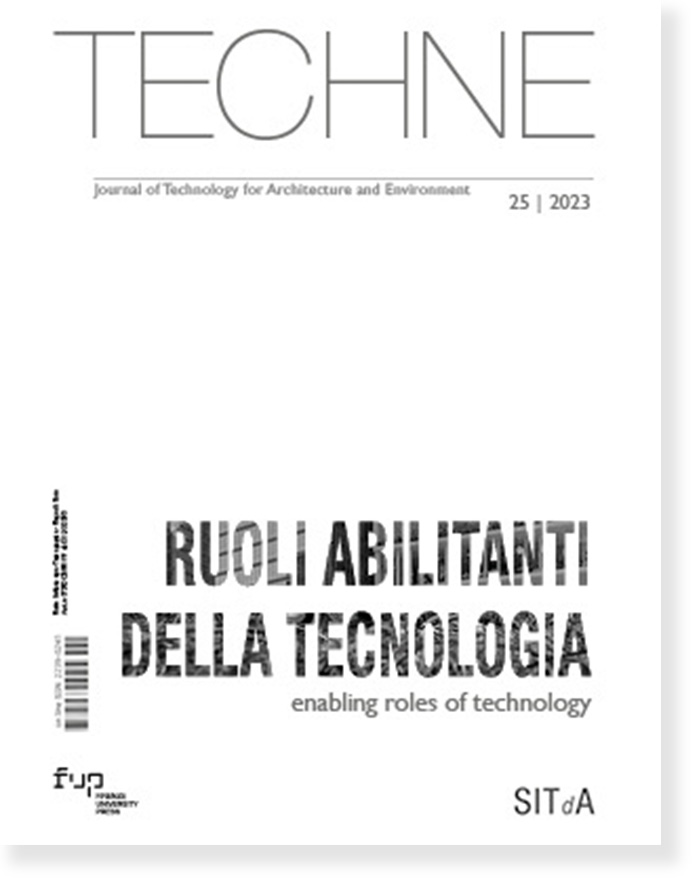Published 2023-05-30
Keywords
- Energy citizenship,
- Positive Energy Districts (PEDs),
- Climate neutrality,
- Energy transition,
- Community
How to Cite
Copyright (c) 2023 Saveria Boulanger, Danila Longo, Giulia Turci, Martina Massari

This work is licensed under a Creative Commons Attribution 4.0 International License.
Funding data
-
H2020 Energy
Grant numbers GA101022317
Abstract
Responses to the current energy crisis and to action against climate change have produced a wide variety of experimentations. Positive Energy Districts (PEDs) and Energy Communities (EC) are spreading as aggregators of enabling technologies, but the knowledge and skills required to plan, implement and monitor them still need to be developed. Technology alone is not enough to facilitate knowledge sharing and the experimentation and co-creation of solutions. The paper focuses on methods and tools that allow to support the creation of “energy citizens” through considerations developed in project H2020 GRETA (Green Energy Transition Actions) and in COST Action ‘PED-EU-NET’.
Downloads
References
Alpagut, B., Akyürek, Ö., Mitre, E.M., 2019. Positive Energy Districts Methodology and Its Replication Potential. Proceedings 20, 8. https://doi.org/10.3390/proceedings2019020008
Atelier project, PED Learning Community Platform [WWW Document], 2022. URL https://www.pedlearning.eu/home (accessed 9.2.22).
Beauchampet, I., Walsh, B., 2021. Energy citizenship in the Netherlands: The complexities of public engagement in a large-scale energy transition. Energy Research & Social Science 76, 102056. https://doi.org/10.1016/j.erss.2021.102056
Bossi, S., Gollner, C., Theierling, S., 2020. Towards 100 Positive Energy Districts in Europe: Preliminary Data Analysis of 61 European Cases. Energies 13, 6083. https://doi.org/10.3390/en13226083
Boulanger, S.O.M., Massari, M., Longo, D., Turillazzi, B., Nucci, C.A., 2021. Designing Collaborative Energy Communities: A European Overview. Energies 14, 8226. https://doi.org/10.3390/en14248226
Cheng, C., Albert-Seifried, V., Aelenei, L., Vandevyvere, H., Seco, O., Nuria Sánchez, M., Hukkalainen, M., 2022. A Systematic Approach Towards Mapping Stakeholders in Different Phases of PED Development—Extending the PED Toolbox, in: Littlewood, J.R., Howlett, R.J., Jain, L.C. (Eds.), Sustainability in Energy and Buildings 2021, Smart Innovation, Systems and Technologies. Springer, Singapore, pp. 447–463. https://doi.org/10.1007/978-981-16-6269-0_38
Civiero, P., Pascual, J., Arcas Abella, J., Bilbao Figuero, A., Salom, J., 2021. PEDRERA. Positive Energy District Renovation Model for Large Scale Actions. Energies 14, 2833. https://doi.org/10.3390/en14102833
Civiero, P., Pascual, J., Arcas Abella, J., Salom, J., 2022. Innovative PEDRERA Model Tool Boosting Sustainable and Feasible Renovation Programs at District Scale in Spain. Sustainability 14, 9672. https://doi.org/10.3390/su14159672
Devine-Wright, P., 2006. Energy Citizenship: Psychological Aspects of Evolution in Sustainable Energy Technologies, in: Governing Technology for Sustainability. Routledge.
Devine-Wright, P., 2004. Towards zero-carbon: Citizenship, responsibility and the public acceptability of sustainable energy technologies. Presented at the Proceedings of Conference C81 of the Solar Energy Society, UK section of the International Solar Energy Society, pp. 51–62.
European Commission, 2019a. Orientations towards the first Strategic Plan for Horizon Europe. Directorate Research and Innovation.
European Commission, 2019b. A European Green Deal [WWW Document]. European Commission - European Commission. URL https://ec.europa.eu/info/strategy/priorities-2019-2024/european-green-deal_en (accessed 7.20.22).
IPCC, 2022a. Climate Change 2022: Impacts, Adaptation, and Vulnerability. Contribution of Working Group II to the Sixth Assessment Report of the Intergovernmental Panel on Climate Change, Cambridge University Press. ed. Cambridge.
IPCC, 2022b. Climate Change 2022: Mitigation of Climate Change. Contribution of Working Group III to the Sixth Assessment Report of the Intergovernmental Panel on Climate Change. Cambridge University Press, Cambridge, UK and New York, NY, USA.
JPI Urban Europe, 2020. White Paper on PED Reference Framework for Positive Energy Districts and Neighbourhoods.
Lennon, B., Dunphy, N., Gaffney, C., Revez, A., Mullally, G., O’Connor, P., 2020. Citizen or consumer? Reconsidering energy citizenship. Journal of Environmental Policy & Planning 22, 184–197. https://doi.org/10.1080/1523908X.2019.1680277
Mee, A., Lyes, M., Crowe, P., 2021. Energy Urbanity and Active Citizen Participation. Energies 14, 6515. https://doi.org/10.3390/en14206515
Olivadese, R., Alpagut, B., Revilla, B.P., Brouwer, J., Georgiadou, V., Woestenburg, A., van Wees, M., 2021. Towards Energy Citizenship for a Just and Inclusive Transition: Lessons Learned on Collaborative Approach of Positive Energy Districts from the EU Horizon2020 Smart Cities and Communities Projects. Proceedings 65, 20. https://doi.org/10.3390/proceedings2020065020
Rathnayaka, A.J.D., Potdar, V.M., Hussain, O., Dillon, T., 2011. Identifying prosumer’s energy sharing behaviours for forming optimal prosumer-communities, in: 2011 International Conference on Cloud and Service Computing. Presented at the 2011 International Conference on Cloud and Service Computing, pp. 199–206. https://doi.org/10.1109/CSC.2011.6138520
Sareen, S., Albert-Seifried, V., Aelenei, L., Reda, F., Etminan, G., Andreucci, M.-B., Kuzmic, M., Maas, N., Seco, O., Civiero, P., Gohari, S., Hukkalainen, M., Neumann, H.-M., 2022. Ten questions concerning positive energy districts. Building and Environment 216, 109017. https://doi.org/10.1016/j.buildenv.2022.109017
Schlindwein, L., Montalvo, C., 2022. Accounting for heterogenous behaviours within transformative policy-making: the case of Energy Citizenship.
Schot, J., Kanger, L, Verbong, G., 2016. The roles of users in shaping transitions to new energy systems | Nature Energy. Nature energy 1, 1–7.
SET-Plan Working Group 3.2, 2018. Europe to become a global role model in integrated, innovative solutions for the planning, deployment, and replication of Positive Energy Districts, SET-Plan Action No 3.2.
Sovacool, B.K., Turnheim, B., Martiskainen, M., Brown, D., Kivimaa, P., 2020. Guides or gatekeepers? Incumbent-oriented transition intermediaries in a low-carbon era. Energy Research & Social Science 66, 101490. https://doi.org/10.1016/j.erss.2020.101490
Turci, G., Alpagut, B., Civiero, P., Kuzmic, M., Pagliula, S., Massa, G., Albert-Seifried, V., Seco, O., Soutullo, S., 2022. A Comprehensive PED-Database for Mapping and Comparing Positive Energy Districts Experiences at European Level. Sustainability 14, 427. https://doi.org/10.3390/su14010427
Wahlund, M., Palm, J., 2022. The role of energy democracy and energy citizenship for participatory energy transitions: A comprehensive review. Energy Research & Social Science 87, 102482. https://doi.org/10.1016/j.erss.2021.102482
Walker, G., Devine-Wright, P., 2008. Community renewable energy: What should it mean? Energy Policy 36, 497–500. https://doi.org/10.1016/j.enpol.2007.10.019






